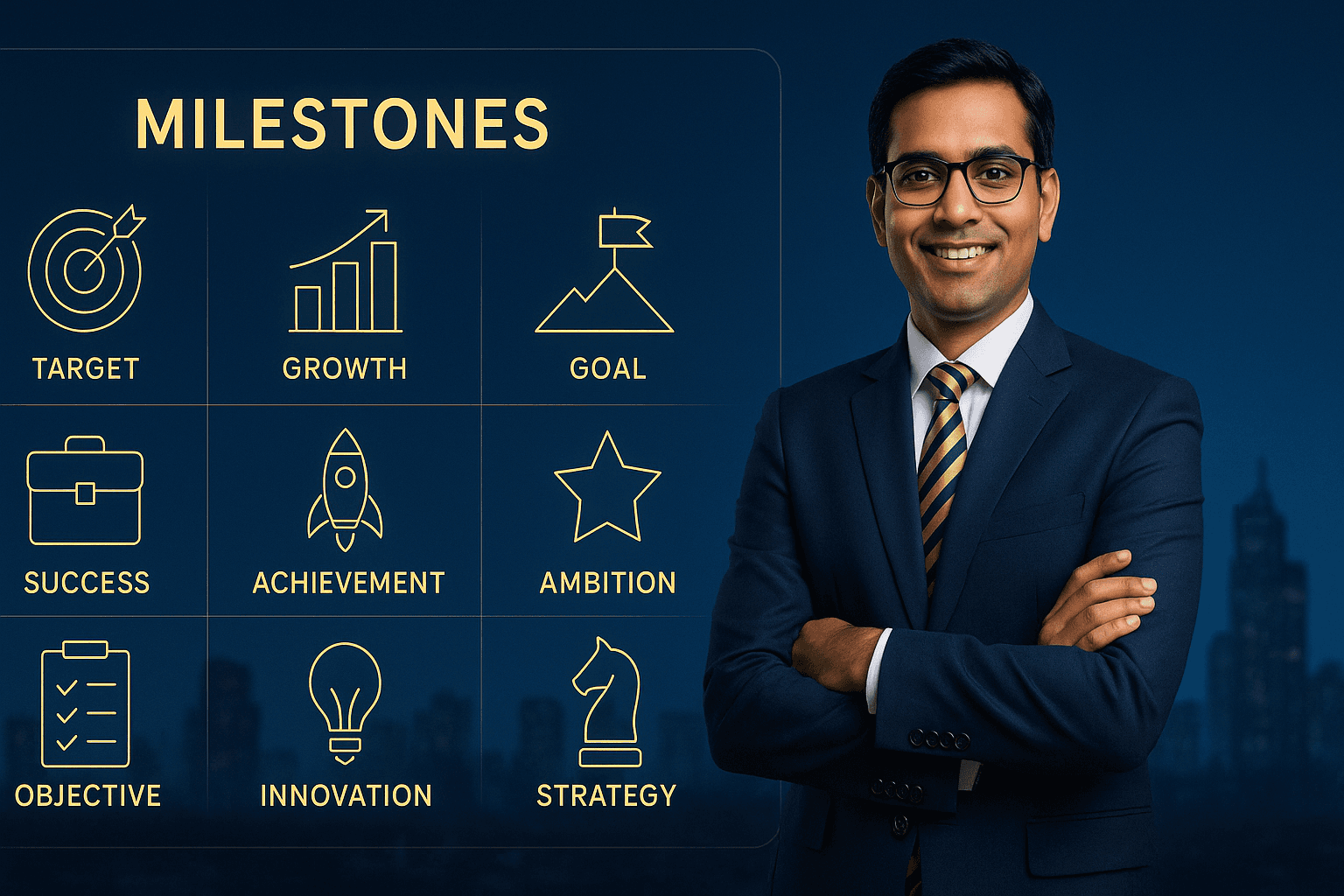9 Essential Money Checkpoints Every Indian Should Complete Before Turning 40
Your Finances Team
Author

Building Financial Security in Your Prime Years
Turning 40 is more than just another birthday"”it's a critical milestone in your financial journey. For many Indians, this decade marks peak earning potential, family responsibilities, and the urgent need to secure their financial future.
Yet, countless people drift through their 30s without a clear financial roadmap, only to wake up at 40 realizing they're far behind their financial goals.
Whether you're a software engineer in Bangalore, a marketing professional in Mumbai, or an entrepreneur in Delhi, the principles of wealth building remain consistent.
This comprehensive guide outlines 9 essential money checkpoints that every Indian should complete before their 40th birthday to build a truly rich and secure life.
Checkpoint 1: Eliminate All High-Interest Debt
Why This Matters for Indians: In India's credit-heavy economy, debt can quickly become a financial anchor. With personal loan interest rates ranging from 12-24% and credit card rates often exceeding 30% annually, high-interest debt acts as a wealth destroyer.
Action Steps:
- Create a comprehensive debt list including:
- Credit card outstanding balances
- Personal loans
- Education loans (if interest rate > 6%)
- Any informal borrowings
- Choose your elimination strategy:
- Avalanche Method: Target highest interest rate first (mathematically optimal)
- Snowball Method: Pay off smallest balances first (psychologically motivating)
- Consider debt consolidation through lower-interest personal loans or balance transfer options
Indian Context: With the rise of digital lending platforms like Bajaj Finserv, Tata Capital, and various fintech lenders, ensure you're not trapped in high-interest EMI cycles that prevent wealth accumulation.
Checkpoint 2: Build a Bulletproof Emergency Fund
Why 6-12 Months is Crucial in India: The Indian job market, while growing, can be volatile. From economic downturns to health emergencies (especially post-COVID), having a substantial emergency fund isn't luxury"”it's necessity.
Implementation Strategy:
- Calculate your monthly expenses including:
- Rent/EMIs
- Utilities and groceries
- Insurance premiums
- Family obligations
- Transportation costs
- Target 6-12 months of these expenses in a high-yield savings account
- Utilize high-yield options:
- Digital savings accounts (Jupiter, Fi Money)
- Sweep-in fixed deposits
- Liquid mutual funds for amounts above ₹5 lakhs
Pro Tip: Keep this fund in a separate account to avoid the temptation of using it for non-emergencies.
Checkpoint 3: Automate Your Investment Journey
The Power of Systematic Investing: With India's growing mutual fund industry and digital investment platforms, automating investments has never been easier. The key is to make investing effortless and consistent.
Implementation Framework:
- Commit to investing minimum 10% of income through:
- ELSS funds for tax benefits
- Large-cap funds for stability
- Mid and small-cap funds for growth
- Maximize retirement accounts:
- Contribute full amount to EPF
- Consider NPS for additional tax benefits
- Explore VPF if your employer allows
- Increase contributions annually by at least 1-2% or whenever you get a salary hike
Digital Tools: Use platforms like Zerodha Coin, Groww, or Paytm Money to set up automatic SIPs that align with your salary dates.
Checkpoint 4: Master Your Career as a Wealth-Building Tool
Career Growth = Wealth Multiplication: In India's competitive job market, your career is your biggest wealth-building asset during your 30s. A strategic approach to career development can double or triple your income before 40.
Strategic Career Moves:
- Identify high-growth sectors:
- Technology and IT services
- Financial services and fintech
- Healthcare and biotechnology
- E-commerce and digital marketing
- Build valuable skills:
- Digital literacy and data analysis
- Leadership and communication
- Industry-specific certifications
- Network strategically:
- Join professional associations
- Attend industry conferences
- Connect with mentors and peers on LinkedIn
- Consider entrepreneurship: India's startup ecosystem offers unprecedented opportunities for wealth creation
Income Growth Target: Aim to at least double your income every 5-7 years through strategic career moves.
Checkpoint 5: Define Your Financial Number and Your 'Why'
Beyond Just Accumulating Money: Many Indians save and invest without clear financial goals. Having a specific target amount and understanding why you want it makes your financial journey more purposeful and achievable.
Defining Your Numbers:
- Retirement Corpus: Calculate how much you need by 60
- Rule of thumb: 25-30 times your annual expenses
- Factor in inflation (6-8% annually in India)
- Consider healthcare costs in retirement
- Children's Education: Plan for rising education costs
- Engineering degree: ₹20-50 lakhs
- Medical degree: ₹50 lakhs-₹2 crores
- International education: ₹50 lakhs-₹1 crore
- Home Ownership: If buying property is a goal
- Down payment (20-30% of property value)
- Registration and other costs (8-10% additional)
Your Financial Why:
- Freedom to pursue passions
- Security for family
- Ability to help parents in old age
- Creating generational wealth
- Social impact and giving back
Checkpoint 6: Create a Shared Financial Dashboard (If Married)
Financial Harmony in Indian Marriages: Money disagreements are a leading cause of marital stress in Indian households. Creating transparency and shared financial goals strengthens both your relationship and wealth-building efforts.
Building Financial Partnership:
- Monthly money meetings:
- Review income and expenses
- Discuss financial goals
- Address any concerns or changes
- Shared tracking tools:
- Use apps like ET Money, Walnut, or simple Excel sheets
- Track joint goals and individual goals
- Monitor investment performance together
- Define roles and responsibilities:
- Who manages day-to-day expenses?
- Who handles investments and insurance?
- How are financial decisions made?
Cultural Considerations: Balance individual financial autonomy with traditional family financial responsibilities, including support for parents and extended family.
Checkpoint 7: Establish Your Financial 'No' List
The Power of Conscious Spending: Indians often struggle with lifestyle inflation and social pressure to spend. Creating a clear 'No' list helps redirect money from low-value expenses to wealth-building activities.
Common Indian 'No' List Items:
- Expensive weddings beyond your means
- Premium cars that don't align with your income
- Frequent dining out at expensive restaurants
- Unnecessary insurance policies with poor returns
- Impulsive shopping during festivals and sales
- Expensive gadgets upgraded annually
- Multiple streaming subscriptions you don't use
Creating Your Personal No List:
- Review last 6 months of expenses
- Identify recurring low-value purchases
- Calculate annual cost of these items
- Redirect this money to investments
Remember: Your 'No' list should evolve as your income and priorities change.
Checkpoint 8: Simplify Your Credit Management
Credit Card Complexity in India: With numerous banks offering attractive credit cards, many Indians end up with multiple cards, leading to financial complexity and potential debt traps.
Simplification Strategy:
- Limit yourself to 2-3 credit cards maximum:
- One primary card for daily expenses (with good rewards)
- One backup card for emergencies
- One specialized card (travel/fuel) if needed
- Monitor interest rates and fees:
- Avoid cards with high annual fees unless benefits justify cost
- Never carry a balance on high-interest cards
- Set up auto-pay for full amount monthly
- Maintain good credit score (750+):
- Pay all bills on time
- Keep credit utilization below 30%
- Check credit report annually
Pro Tip: Use credit cards for convenience and rewards, never for borrowing money.
Checkpoint 9: Develop and Refine Your Financial Vision
Annual Financial Planning: Your financial goals and priorities will evolve as you progress through your 30s. Regular review and adjustment ensure your money is aligned with your changing life circumstances.
Annual Review Process:
- Assess current financial health:
- Net worth calculation
- Investment portfolio performance
- Insurance coverage adequacy
- Tax optimization review
- Evaluate changing priorities:
- Career goals and potential changes
- Family planning considerations
- Lifestyle aspirations
- Risk tolerance adjustments
- Adjust strategies accordingly:
- Rebalance investment portfolio
- Increase or decrease savings rate
- Modify insurance coverage
- Update estate planning documents
Life Stage Considerations:
- Early 30s: Focus on career growth and debt elimination
- Mid-30s: Balance growth investments with family security
- Late 30s: Increase focus on retirement planning and wealth preservation
The Indian Advantage: Making These Checkpoints Work
Unique Opportunities in India:
- Tax Benefits: Maximize Section 80C, 80D, and NPS benefits
- Growing Economy: Benefit from India's long-term growth story
- Digital Revolution: Use technology for easier financial management
- Family Support: Leverage family financial planning for better outcomes
Cultural Adaptations:
- Include support for parents in financial planning
- Consider joint family financial goals
- Factor in traditional investments (gold, real estate) appropriately
- Balance individual wealth building with family obligations
Your Action Plan: Starting Today
Week 1: Assessment
- Calculate net worth
- List all debts
- Review current investments
- Identify immediate priorities
Month 1: Foundation
- Set up emergency fund
- Automate debt payments
- Start or increase SIP investments
- Define financial goals
Quarter 1: Optimization
- Streamline credit cards
- Create shared financial dashboard (if married)
- Establish 'No' list
- Begin career skill development
Year 1 and Beyond: Growth
- Annual financial reviews
- Career advancement
- Investment portfolio optimization
- Continuous learning and adjustment
Conclusion: Your Rich Life Awaits
Completing these 9 financial checkpoints before 40 isn't just about accumulating money"”it's about creating the foundation for a rich, fulfilling life. In India's rapidly evolving economy, those who master these fundamentals will have the financial freedom to pursue their dreams, support their families, and make a positive impact on society.
Remember, building wealth is a marathon, not a sprint. Start where you are, use what you have, and do what you can. Every small step taken consistently over time compounds into significant financial success.
Your 40s should be about enjoying the fruits of your earlier financial discipline, not scrambling to catch up. Start implementing these checkpoints today, and future you will thank present you for the wisdom and discipline to build a truly rich life.
Take the first step today: Pick one checkpoint that resonates most with your current situation and begin implementation this week. Your journey to financial freedom starts with a single, conscious decision to take control of your financial future.
Written by
Your Finances Team
Helping Indians make better financial decisions through simple, actionable advice.
Continue Reading

ETF Investing in India 2025 | Benefits, Types & Best Platforms
Ready to level up your money game without getting lost in boring finance talk? If you're tired of seeing your savings sit in a bank account earning peanuts while inflation eats away at your purchasing...

12 Common Mutual Fund Mistakes That Are Costing Indian Investors Crores (And How to Avoid Them)
Let's be real — investing in mutual funds isn't rocket science, but somehow many of us still mess it up big time. Whether you're a college student starting your first SIP with ₹500 or someone who ...

Best Gold ETFs in 2025: Complete Guide for Indian Investors
Gold has always been a precious metal highly valued in Indian culture, traditionally bought for weddings, festivals, and as a store of wealth. However, the way Indians invest in gold has evolved signi...